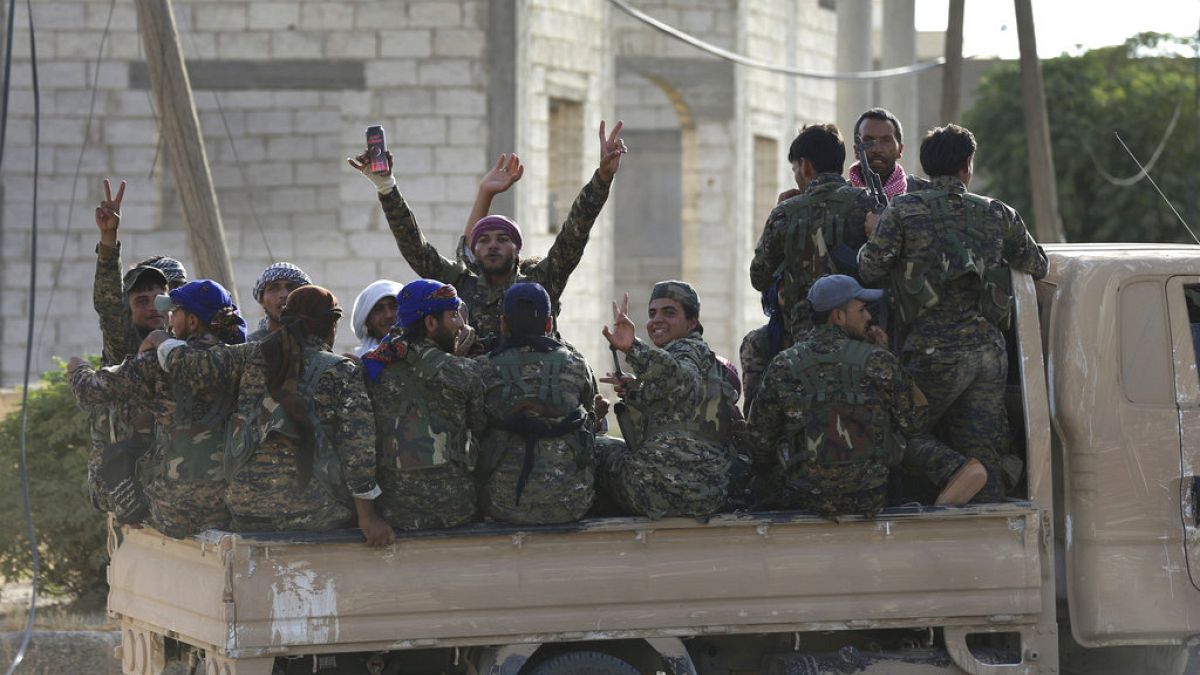Tensions Rise as Turkey Prepares for Potential Northern Syria Invasion Targeting U.S.-Allied Kurds
JERUSALEM — Turkish President Recep Tayyip Erdoğan is reportedly on the brink of launching a military offensive in northern Syria. The primary targets of this campaign are the Syrian Kurdish forces, who are aligned with the United States through the Syrian Democratic Forces (SDF). These Kurdish fighters played a significant role in the defeat of the Islamic State (ISIS) in 2019, a victory achieved in collaboration with U.S. military efforts.
The Fragile Cease-Fire
Despite a cease-fire aimed at reducing hostilities between Turkey and the SDF—brokered by the United States—on-the-ground conditions suggest that this agreement has been largely ignored. Reports from northern Syria reveal that Turkish-backed forces, including the Syrian National Army (SNA) and various factions loyal to Erdoğan’s government, are mobilizing strategically near the city of Kobani. An anonymous source from the SDF disclosed to Fox News Digital that, “Assaults on the Tishreen Dam continue intermittently. We confront and push them back, but Turkish drones and artillery are constantly targeting us.” According to the source, notable support from international allies has been thin, apart from U.S. mediation efforts to secure a lasting cease-fire.
Erdoğan’s Allies and U.S. Officials’ Concerns
Key actors in the anticipated attack are reported to be divisions such as Al Hamza and Sultan Suleiman Shah of the SNA—groups that express loyalty to Turkey’s ultranationalist Nationalist Movement Party (MHP), an important ally of Erdoğan. In light of these developments, some U.S. officials have raised alarms. Simone Ledeen, a former U.S. Deputy Assistant Secretary of Defense for the Middle East, argued for increased U.S. support for the SDF, warning that “Turkey, our NATO ally, is enabling a rapidly expanding jihadist threat.” Ledeen emphasized that reinforcing the SDF is essential to maintain their operational capability against potential aggressors.
A spokesperson from the U.S. State Department accentuated the delicate situation in the region, calling for a de-escalation of tensions and efforts aimed at stability. “This is a time to increase stability, not devolve into further conflict,” the spokesperson stated. They also reiterated the Biden administration’s commitment to a Syrian-led political resolution, emphasizing U.N. Security Council Resolution 2254, and the ongoing defeat of ISIS.
Fear of ISIS Resurgence Amid Turkey’s Offensive
The growing tensions in northern Syria raise concerns regarding the security of thousands of ISIS detainees currently held in facilities administered by the SDF. Experts in counter-terrorism warn that a military campaign against the SDF could create the ideal conditions for ISIS to exploit the chaos, posing a renewed threat to both U.S. and global security interests.
In response to Erdoğan’s provocative actions, U.S. lawmakers have voiced their discontent. Senator John Kennedy (R-La.) directly implored Erdoğan, stating, “Leave the Kurds alone. The Kurds are America’s friends… They helped us destroy ISIS, and if you invade Syria and harm them, I’ll ask Congress for tough sanctions against Turkey.” Kennedy’s comments indicate a readiness among U.S. legislators to pursue significant economic sanctions that could destabilize Turkey’s already vulnerable economy.
Turkey’s Stance: A Denial of Targeting Kurds
In light of these heightened tensions, Turkey’s Foreign Ministry has categorically denied allegations that it aims to target Syrian Kurds, dismissing such claims as “groundless.” The ministry reiterated that Turkey’s military operations fall within their broader mandate to combat terrorism, distinguishing between ordinary Syrian Kurds and groups like the Kurdistan Workers’ Party (PKK), which both Turkey and the United States designate as a terrorist organization. A spokesman for Turkey added, “The Syrian people are striving to expel the PKK/YPG and the SDF from their territories. They have already succeeded in cities like Manbij and Deir ez-Zor, and are close to achieving this in Raqqa.”
The Role of U.S. Diplomacy and Congressional Action
As tensions escalate, the U.S. finds itself in a precarious balancing act, attempting to support both the SDF and Turkey while promoting peace. Reports suggest that negotiations involving the SDF, Turkey, and the U.S. have stalled, largely due to Turkey’s refusal to make crucial concessions, including addressing the transfer of Suleiman Shah’s remains and arranging safe passage for civilians in northern Syria.
In a bipartisan initiative, Senators Chris Van Hollen (D-Md.) and Lindsey Graham (R-S.C.) have introduced the “Countering Turkish Aggression Act of 2024.” This proposed legislation aims to impose economic sanctions, thereby pressuring Turkey into negotiating a sustainable cease-fire and establishing a viable demilitarized zone. According to reports from Reuters, both lawmakers endorse diplomatic measures while maintaining a stringent sanctions strategy to influence Turkey’s behavior.
Call for a Historic U.S.-Brokered Resolution
Experts such as Shukriya Bradost, who specializes in Kurdish issues, advocate for a comprehensive and historic resolution brokered by the U.S. They argue that a genuine commitment to addressing the root causes of the conflict and supporting democratic governance could help mitigate the ongoing tensions. In the face of a potential invasion, it is crucial that the international community remains vigilant and remembers the sacrifices made by Kurdish forces in the fight against ISIS.
Conclusion
As the threat of a new military operation looms, the stakes in northern Syria have never been higher. The potential for increased violence and instability not only jeopardizes the SDF but could also create a void that ISIS might exploit. The U.S. faces a critical juncture in its foreign policy approach, where balancing relationships and sustaining stability in the region will require responsive action and diplomatic ingenuity.
